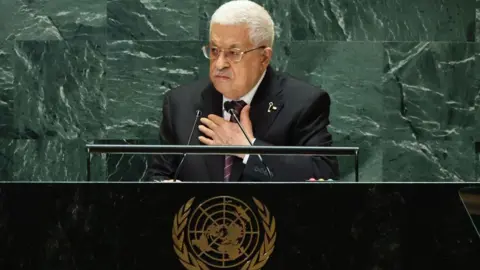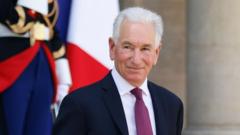July 22, 2025
By Aurelien Breeden
Reporting from Paris
In a striking move, the United States has announced its decision to withdraw from UNESCO, the United Nations' cultural organization, marking another turn in the Trump administration's foreign policy that prioritizes unilateralism over multilateral engagement. The State Department's statement revealed that this withdrawal is set to take effect at the end of next year, echoing President Trump's longstanding skepticism towards international institutions.
“The continued involvement in UNESCO does not align with the national interests of the United States,” said Tammy Bruce, a spokeswoman for the State Department. She criticized the organization for its focus on what she described as “divisive social and cultural causes,” arguing that it promotes an international development agenda contrary to the America First doctrine.
The relationship between the U.S. and UNESCO has experienced significant turbulence over the years, particularly following the organization's decision in 2011 to admit Palestine as a full member, which led to the cessation of U.S. funding based on established legal frameworks against monetary support for agencies recognizing Palestinian membership. This financial withdrawal resulted in a 20% budget shortfall for UNESCO, subsequently compelling the organization to cut back on several initiatives.
In 2017, amid a politically charged atmosphere, the Trump administration formally exited UNESCO, citing alleged anti-Israel bias as a principal reason. During Trump's first term, the U.S. merely maintained the status of a nonmember observer. However, the Biden administration opted to re-enter the organization in 2023, arguing that U.S. absence was allowing rival powers, particularly China, to gain influence over culturally significant areas.
The latest announcement from the Trump administration follows an executive order signed by the president that initiated a review of U.S. affiliations with the United Nations, including UNESCO, with White House staff challenging the organization's perceived anti-American sentiment. UNESCO is internationally recognized for its educational, scientific, and cultural programs, and plays a critical role in designating World Heritage sites and promoting initiatives that aim to protect the planet and foster equality.
As the U.S. prepares to sever ties with UNESCO again, the implications of this move resonate deeply with America's broader international strategy and its commitment to multilateralism, indicating a steady trend towards isolationism in an increasingly interconnected world.
Aurelien Breeden is a reporter for The Times in Paris, covering news from France.
By Aurelien Breeden
Reporting from Paris
In a striking move, the United States has announced its decision to withdraw from UNESCO, the United Nations' cultural organization, marking another turn in the Trump administration's foreign policy that prioritizes unilateralism over multilateral engagement. The State Department's statement revealed that this withdrawal is set to take effect at the end of next year, echoing President Trump's longstanding skepticism towards international institutions.
“The continued involvement in UNESCO does not align with the national interests of the United States,” said Tammy Bruce, a spokeswoman for the State Department. She criticized the organization for its focus on what she described as “divisive social and cultural causes,” arguing that it promotes an international development agenda contrary to the America First doctrine.
The relationship between the U.S. and UNESCO has experienced significant turbulence over the years, particularly following the organization's decision in 2011 to admit Palestine as a full member, which led to the cessation of U.S. funding based on established legal frameworks against monetary support for agencies recognizing Palestinian membership. This financial withdrawal resulted in a 20% budget shortfall for UNESCO, subsequently compelling the organization to cut back on several initiatives.
In 2017, amid a politically charged atmosphere, the Trump administration formally exited UNESCO, citing alleged anti-Israel bias as a principal reason. During Trump's first term, the U.S. merely maintained the status of a nonmember observer. However, the Biden administration opted to re-enter the organization in 2023, arguing that U.S. absence was allowing rival powers, particularly China, to gain influence over culturally significant areas.
The latest announcement from the Trump administration follows an executive order signed by the president that initiated a review of U.S. affiliations with the United Nations, including UNESCO, with White House staff challenging the organization's perceived anti-American sentiment. UNESCO is internationally recognized for its educational, scientific, and cultural programs, and plays a critical role in designating World Heritage sites and promoting initiatives that aim to protect the planet and foster equality.
As the U.S. prepares to sever ties with UNESCO again, the implications of this move resonate deeply with America's broader international strategy and its commitment to multilateralism, indicating a steady trend towards isolationism in an increasingly interconnected world.
Aurelien Breeden is a reporter for The Times in Paris, covering news from France.























